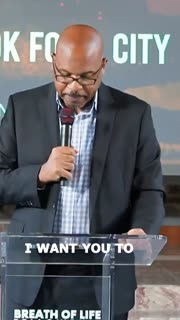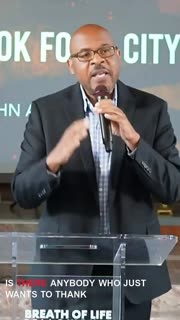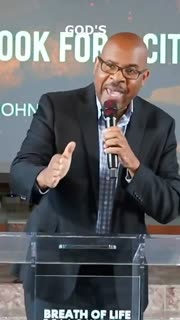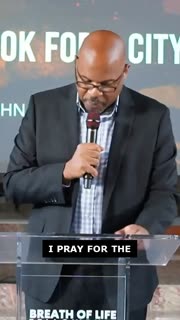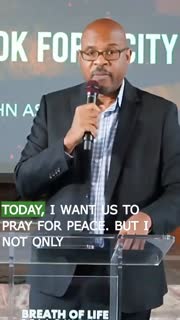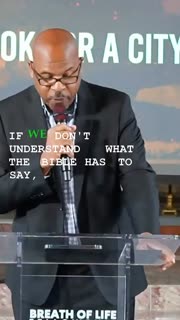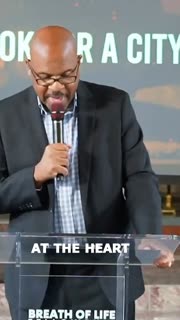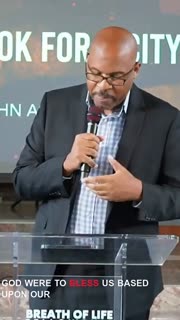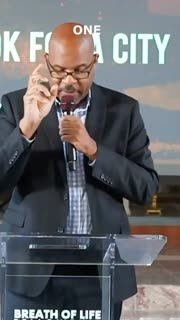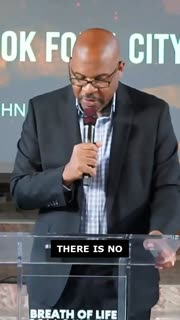Divine Stewardship: Hope and Peace Amid Conflict
Devotional
Sermon Summary
Bible Study Guide
Sermon Clips
### Quotes for Outreach
1. "I want you to understand today, if you don't know, it pays to serve God. The Psalmist said it right when he declared, I was young and now I am old and yet I have never seen the righteous forsaken or the children begging bread. It pays to serve God." [41:16] (28 seconds)
2. "Is there anybody who just wants to thank God for being God all by himself? The book of Ezekiel paints an awful picture of God's people defiling even the sanctuary by worshiping other gods. And as a punishment, God allowed the Babylonians to descend upon the people he loved and they took them captive." [43:55] (34 seconds)
3. "Today God's presence is here with us in this temple. Today Christians are a holy nation. A royal priesthood called to mediate God's grace to a world filled with darkness and violence. Christians have no homeland. We have no sacred temples. We have no holy ground. Wherever two or three are gathered in the name of Jesus, there is where His presence will be." [54:44] (43 seconds)
4. "I pray for the day where the words of Isaiah will be fulfilled and they shall beat their swords into plowshares and their spears into pruning hooks. Nations shall not lift up sword against nation, and neither shall they war any more." [01:02:11] (21 seconds)
5. "Today, I want us to pray for peace. But I not only want us to pray for peace, I want us to live for peace with our deeds. Let peace reign in our homes. Let peace reign in our church. Let peace reign in our community. Let us lift up a gospel that will bring peace to a world that seeks violence. May God bless you." [01:03:51] (49 seconds)
### Quotes for Members
1. "If we don't understand what the Bible has to say, we will find ourselves fighting where we should seek peace and silent where we should speak truth to power. Genesis chapters 12, 15, and 17, the Bible tells us that God called Abraham from the land of his birth and gave him a new name, Abraham." [31:00] (37 seconds)
2. "At the heart of the struggle between Israel and Palestine is a fight over land lost during war. There is no automatic requirement to return land lost in battle. Our modern minds accept the view that land taken by force is land that is lost forever. Native Americans and peoples of African descent understand this all too well." [38:06] (34 seconds)
3. "If God were to bless us based upon our faithfulness, we would be slaves. But we serve a God who blesses us based upon his grace. And he lifts us where we don't belong and places us among the stars as a witness to his greatness and for his glory." [43:25] (22 seconds)
4. "In one encounter, Jesus expanded his presence beyond the temple and his ministry to people beyond physical Israel and the borders of Jerusalem. Please understand what this magnificent encounter means. In the past, God only called Israel as his elect. But now, because of Christ, he calls all. He calls black men and white men. Jews and Gentiles. Men and women. Boys and girls. All are precious in his sight and in Christ are heirs to the promises made to Abraham." [51:27] (53 seconds)
5. "Under the new covenant, there is no land to conquer, only hearts. Under the new covenant, there is no temple to be rebuilt because we are the temple of the Holy Ghost which is in us. 1 Corinthians 6.19. In other words, we no longer need a temple to experience the presence of God wherever we go as long as we remain in Christ. Christ's Spirit dwells in us. And we in Him." [53:41] (33 seconds)
Ask a question about this sermon
1. "I want you to understand today, if you don't know, it pays to serve God. The Psalmist said it right when he declared, I was young and now I am old and yet I have never seen the righteous forsaken or the children begging bread. It pays to serve God." [41:16] (28 seconds)
2. "Is there anybody who just wants to thank God for being God all by himself? The book of Ezekiel paints an awful picture of God's people defiling even the sanctuary by worshiping other gods. And as a punishment, God allowed the Babylonians to descend upon the people he loved and they took them captive." [43:55] (34 seconds)
3. "Today God's presence is here with us in this temple. Today Christians are a holy nation. A royal priesthood called to mediate God's grace to a world filled with darkness and violence. Christians have no homeland. We have no sacred temples. We have no holy ground. Wherever two or three are gathered in the name of Jesus, there is where His presence will be." [54:44] (43 seconds)
4. "I pray for the day where the words of Isaiah will be fulfilled and they shall beat their swords into plowshares and their spears into pruning hooks. Nations shall not lift up sword against nation, and neither shall they war any more." [01:02:11] (21 seconds)
5. "Today, I want us to pray for peace. But I not only want us to pray for peace, I want us to live for peace with our deeds. Let peace reign in our homes. Let peace reign in our church. Let peace reign in our community. Let us lift up a gospel that will bring peace to a world that seeks violence. May God bless you." [01:03:51] (49 seconds)
### Quotes for Members
1. "If we don't understand what the Bible has to say, we will find ourselves fighting where we should seek peace and silent where we should speak truth to power. Genesis chapters 12, 15, and 17, the Bible tells us that God called Abraham from the land of his birth and gave him a new name, Abraham." [31:00] (37 seconds)
2. "At the heart of the struggle between Israel and Palestine is a fight over land lost during war. There is no automatic requirement to return land lost in battle. Our modern minds accept the view that land taken by force is land that is lost forever. Native Americans and peoples of African descent understand this all too well." [38:06] (34 seconds)
3. "If God were to bless us based upon our faithfulness, we would be slaves. But we serve a God who blesses us based upon his grace. And he lifts us where we don't belong and places us among the stars as a witness to his greatness and for his glory." [43:25] (22 seconds)
4. "In one encounter, Jesus expanded his presence beyond the temple and his ministry to people beyond physical Israel and the borders of Jerusalem. Please understand what this magnificent encounter means. In the past, God only called Israel as his elect. But now, because of Christ, he calls all. He calls black men and white men. Jews and Gentiles. Men and women. Boys and girls. All are precious in his sight and in Christ are heirs to the promises made to Abraham." [51:27] (53 seconds)
5. "Under the new covenant, there is no land to conquer, only hearts. Under the new covenant, there is no temple to be rebuilt because we are the temple of the Holy Ghost which is in us. 1 Corinthians 6.19. In other words, we no longer need a temple to experience the presence of God wherever we go as long as we remain in Christ. Christ's Spirit dwells in us. And we in Him." [53:41] (33 seconds)
